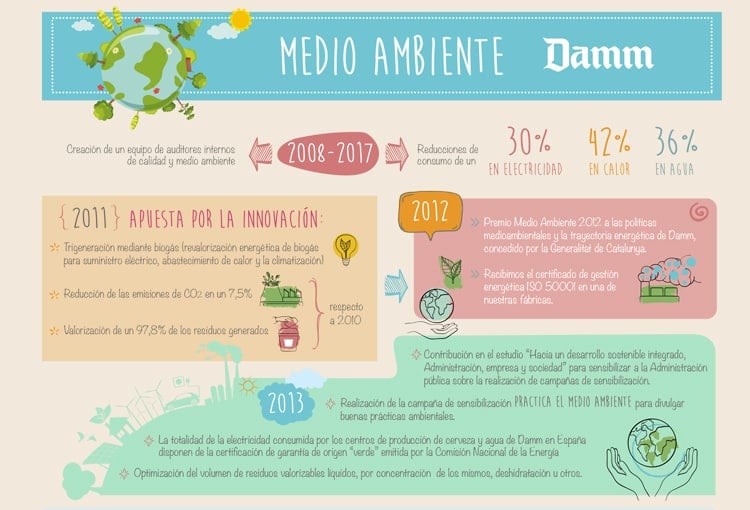Damm reduces its impact on the environment

New technology and collaboration with suppliers have been the key, leading to considerable improvements
On the occasion of World Environment Day, Damm highlighted the strategy that has been put into practice to reduce the impact of its activity on the environment, through extensive measures undertaken in partnership with customers, suppliers, employees and other stakeholders.
As a result of Damm’s firm commitment to respect for the environment, the company has put in place an environmental management system. The main principles of its environmental policy are: promoting sustainability in all company activities; favouring the use of local resources (95% of suppliers are from the Iberian Peninsula); reducing impact on the environment and preventing possible pollution throughout the complete lifecycle of products and services; promoting actions aimed at reducing, reusing and recycling; and supporting the purchase of energy efficient goods and products.
To implement the sustainability strategy, in which suppliers are participants, Damm has a system of homologation and monitoring that establishes requirements and standards, depending on the type of service or product required: quality, service, logistics, technical, environmental, financial, etc. For example, in 2017, audits of suppliers and in situ audits were carried out to ensure compliance with quality and work regulations and requirements.
Commitment to the circular economy model
One of Damm’s most notable transformations has been the transition from a linear economy model to a circular economy model, based on producing, using and regenerating or recycling. This implies the conversion of waste into materials or resources, increasing the useful life of products and significantly reducing the generation of waste.
The use of technology and the awareness, involvement and active participation of the entire organisation, along with cooperation with suppliers and customers, have been the key to achieving results.
Energy, a key feature of the sustainability strategy
Damm has created a Department of Energy Efficiency and Environment that has ensured continuous improvement in energy performance.
In addition, in recent years the company has invested in renewable and energy-efficient generation sources (cogeneration and trigeneration from biogas, solar-photovoltaic energy, etc).
Proof of this is that 100% of the electricity consumed in Damm’s breweries comes from renewable energy sources and is certified as green.
Optimisation of the use of water
Another pioneering project in the beer sector is the calculation of the water footprint, which Damm plans to carry out in all its breweries during 2018. The water footprint is a global indicator of the use of fresh water resources. For making beer, this is defined as the volume of water consumed both directly in the brewing process itself and indirectly throughout the supply chain, including raw materials and packaging. The effort to use water efficiently in the breweries has reduced their utilization ratio by 36%.
Juan Antonio López Abadía, Director of the Department of Energy Efficiency and Environment at Damm says that "Damm has always been committed to sustainability and we are making significant progress in this area thanks to the contribution of the entire team and our commitment to innovation and new technology. Each year we achieve more efficiencies in the use of resources and reduce the environmental impact of our activity. And our commitment is to continue working in this way."


